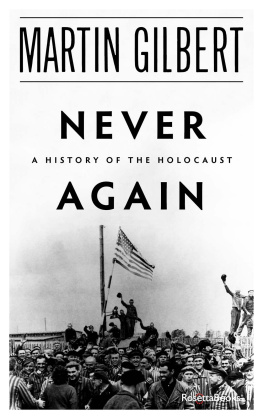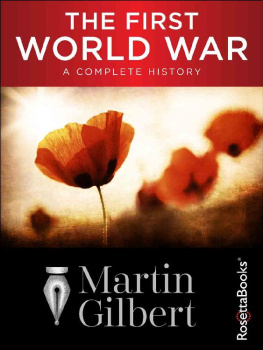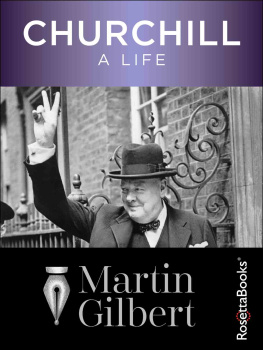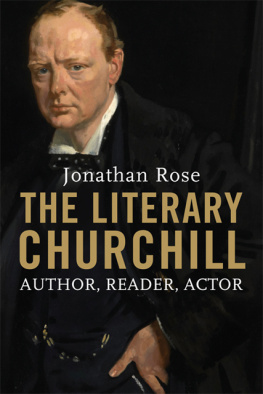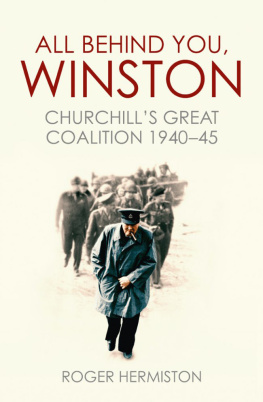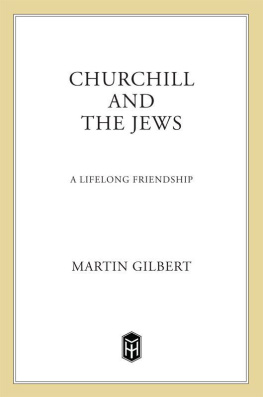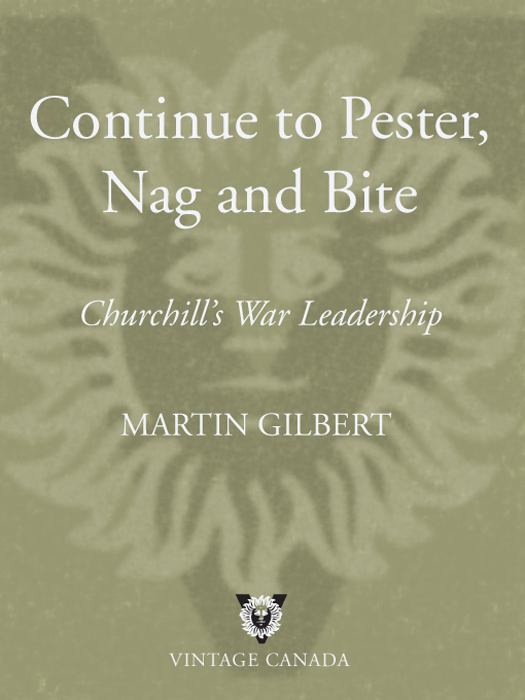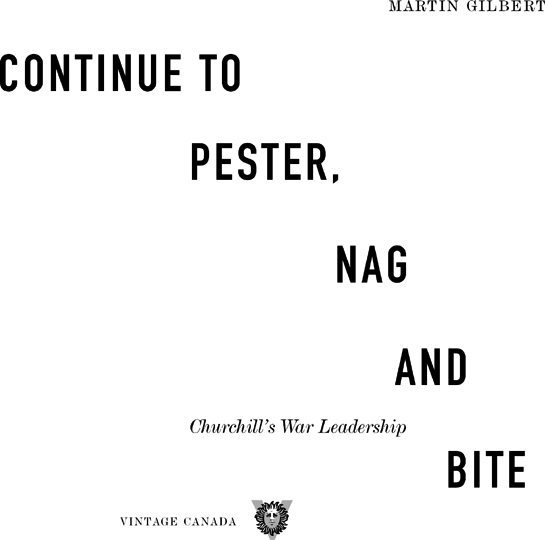The problem is not winning the war,
but persuading people to let you win it.
Winston S. Churchill
THE CHURCHILL BIOGRAPHY
Volumes by Martin Gilbert
Volume III: The Challenge of War 19141916
Document Volume III: (in two parts)
Volume IV: World in Torment 19171922
Document Volume IV: (in two parts)
Volume V: Profit of Truth 19221939
Document Volume V: The Exchequer Years 19221929
Document Volume V: The Wilderness Years 19291935
Document Volume V: The Coming of War 19361939
Volume VI: Finest Hour 19391941
The Churchill War Papers, Document Volume 1:
At the Admiralty September 1939May 1940
The Churchill War Papers, Document Volume 2:
Never Surrender MayDecember 1940
The Churchill War Papers, Document Volume 3: 1941:
The Ever-Widening War
Volume VII: Road to Victory 19411945
Volume VIII: Never Despair 19451965
Churchill: A Life
Churchill: A Photographic Portrait
Churchills Political Philosophy
Introduction
In February 2002 I was asked to speak in the White House about Churchills war leadership. I was invited into the Oval Office, where I showed the President the bust of Churchill that had recently been presented to him by the British Embassy in Washington, and to which he had given pride of place. As the twenty-first century began, a President of the United States was embarking on two military expeditions, the first against Afghanistan and the second against Iraqnot unlike the British punitive expeditions a century earlier, in which Churchill had taken part.
In the second of those early-twenty-first-century expeditions, the one against Iraq, a British Prime Minister joined the United States with commitment and conviction. The Anglo-American war effort against Iraq involved every aspect of war leadership in a small conflict, even though it will be at least a decade before the real stories of that leadership will begin to emerge through the archives of the conflict: the true nature of the Anglo-American link, the Secret Intelligence dimension, the actual relationship between the leaders and their Ministers and advisers, and the precise pattern of decision-making and execution of orders.
These are important matters for recent history, but they are minor compared with the leadership aspects of the Second World War. Unlike the Iraqi adversary in 2003, the German enemy sixty years earlier was able to sustain a ferocious aerial bombardment for more than two years, to sustain a devastating submarine offensive for three years, and to fight tenaciously in the field for more than five years. In addition, Germany was able to acquire, after two years of victorious fighting, a remorseless ally: Japan.
War leadership during the Second World War required intensive concentration and decision-making over a lengthy period, filled with dangers and uncertainties on a scale that has not been repeated since then, even in Korea and Vietnam, harsh and prolonged though those conflicts were. In that regard, Churchills war leadership can have no parallel, unless the world plunges back into a disaster of epic proportions, in which an added dimension could well be the nuclear one.
Leadership against global terrorism requires qualities of a different order, which even now are being formulated and put into practice. In the hope that there may still be some aspects of Churchills war leadership that can be of service in the present conflict, this lecture is dedicated to President George W. Bush and Prime Minister Tony Blair.
WHEN WINSTON CHURCHILL BECAME Prime Minister on 10 May 1940, he had been a Member of Parliament for almost forty years. For more than twenty-five of those years he had held high ministerial office, with responsibilities that covered many spheres of national policy and international affairs. Central to the strength of his war leadership was this experience. Churchill could draw upon knowledge acquired in the many fierce political battles and tough international negotiations in which he had been a central and often successful participant. My knowledge, which has been bought, not taught, was how he expressed it in the House of Commons during a stormy interwar debate on defence.
Churchills knowledge had often been bought at the price of unpopularity and failure. But, above all, it was the experience of dealing, both as a Cabinet Minister from 1905 and as a member of the Committee of Imperial Defence from 1909, with a wide range of national and world issues, and also of persuading a frequently hostile House of Commons to accept the logic and argument of government policy. That experience served as an essential underpinningand strengtheningof his leadership in the Second World War. For a decade before the First World War, four Prime MinistersCampbell-Bannerman, Asquith, Lloyd George and Baldwineach entrusted Churchill with contentious issues, having a high regard for his negotiating and persuasive skills. The experience he gained was considerable. In 1911 he had been a pioneer of industrial conciliation and arbitration at a time of intense labour unrest. In 1913 he had led the search for an amelioration of Anglo-German naval rivalry. In 1914 his duties as First Lord of the Admiralty (the post he was to hold again on the outbreak of war in 1939) included both the air defence of London and the protection of the Royal Navy and merchant shipping from German naval attack. In 1917 he was put in charge of munitions production in Britain at a time of the greatest need and strain. In 1919 he devised, as a matter of urgency, a system of demobilization that calmed the severe tensions of a disaffected soldiery. In the early 1920s he had been at the centre of resolving the demands of Irish Catholics for Home Rule and of the firstand effectively the lastborder delineation dispute between Southern Ireland and Ulster. At the same time, he had undertaken the complicated task of carrying out Britains promise to the Jews of a National Home in Palestine after the First World War.
This experience of dealing at the centre with Britains major national needs, during more than three decades, gave Churchill a precious boon from the first days of his premiership. It also provided him with many specific pointers to war direction. A quarter of a century before he became Prime Minister, he had seen the perils that accompanied the evolution of war policy when there was no central direction. He had been a member of the War Council in 1914, when the Prime Minister, Asquith, had been unable to exercise effective control over the two Service departmentsthe army and the navy. To redress this problem, on becoming Prime Minister in May 1940, Churchill created the post, hitherto unknown in Britain, of Minister of Defence. Although the new Ministry had no departmental structure as such, it did have a secretariat, headed by General Hastings Ismay, who served, with his small staff, as a direct conduit between the Prime Minister and the Chiefs of Staffthe respective heads of the army, navy and air force. This structure enabled Churchill to put forward his suggestions directly, and with the utmost directness, to those who would have to accept or reject, modify and implement them.
The organization of his wartime premiership was a central feature of Churchills war leadership. That organization took several months to perfect, but from his first days as Prime Minister and Minister of Defence he worked to establish it, and to create in the immediate ambit of 10 Downing Street an organization that would give the nation strong and effective leadership. At its core was the close relationship between Churchill and the three Chiefs of Staff. Their frequent meetings, often daily, enabled him to discuss with them the many crises of the war, to tackle the many emergencies, and to decide on an acceptable common strategy. Working under the Chiefs of Staff, and in close association with Churchill through the Ministry of Defence, were two other essential instruments of military planning: the Joint Planning Staff (known as the Joint Planners) and the Joint Intelligence Committee.



